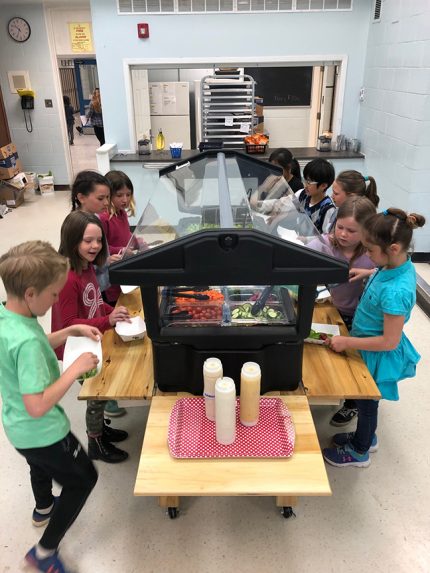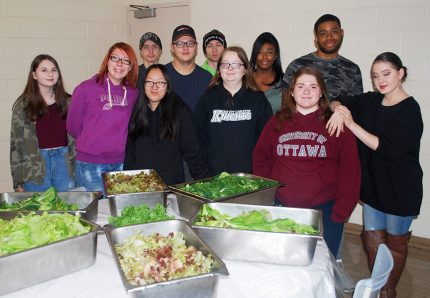Salad Bar Grantees demonstrate the power of Farm to School
Posted: October 10, 2019
Categories: Edible Education Network / Good Food Ideas for Kids / GoodFoodBites / News from Sustain Ontario / Schools
To celebrate Farm to School Month, we thought we would share some of the profound impact Farm to School (F2S) programs are having across the province and country by taking a look at the latest round of Farm to School: Canada Digs In! grant recipients.
Farm to Cafeteria Canada (F2CC) partnered with the Whole Kids Foundation and the Public Health Agency of Canada (PHAC) to establish the Farm to School: Canada Digs In! program. The intention of the program is to fuel change in Canadian schools by getting healthy, local, sustainable food on the plates and minds of students through support for school gardens, nutrition education, advocacy training and salad bars.
For the last few months, 2018-2019 grantees have been sharing their stories on F2CC’s blog. You’ll see in the stories that—like in previous years—’Salad Bar Day’ gains popularity among students quickly, with lines forming across school cafeterias of eager students waiting to fill their plates with healthy, fresh greens and veggies!
At Carleton Village Sports & Wellness Academy in Toronto, students were overheard saying things like, “Snack time is one of the best times of the day!” Teacher supporter Ms. MacVicar said she watched in amazement as her grade 1-2 class devoured heaps of broccoli and melon. A volunteer mom also shared that her 6-year old son has started eating vegetables at home because he wanted to follow his friends’ tastes at school.
Bruce Peninsula District School (BPDS) in Lion’s Head is also seeing students try vegetables that they’ve never tried before. And it doesn’t stop there — BPDS’s story demonstrates the diverse learning opportunities in F2S: their secondary shop class worked to design and build a wood table for the salad bar, made on casters to easily roll into place, with sides that flip up to provide a place for the students to put their bowls while they build their salads and a place at the end for the dressings, bowls and forks.
Lambton-Kent Composite School (LKCS) in Dresden further highlighted cross-curricular learning opportunities: “By expanding the participation of more students and classes, such as Green Industries, Construction Technology, and Science in the salad bar program, we anticipate the establishment of a cross-curricular program that is sustainable for years to come.” Their food and nutrition class also prepares the salads every Thursday, serving up hands-on food education with the salad bar program. Future plans at LKCS include using their on-site greenhouse to incorporate school-grown produce as part of the salad bar.
The grant allowed Sir Guy Carleton Secondary in Ottawa to diversify their school’s growing capabilities, too. In addition to an existing aquaponic system and an outdoor garden, this year they added three new tower gardens and created a new raised bed soil garden to increase production for service in the cafeteria. In fact, on a week where lettuce was being recalled across North America due to E. coli, Sir Guy Carleton served at least 115 free plates of salad bar using lettuce grown in their aquaponic and hydroponic systems!
Mohammad Taha, a grade 12 student in Toronto at Marc Garneau Collegiate Institute, shared in their story some insightful thoughts on the power of good food in schools:
“The Salad-Bar is a fun and joyful introduction to the world of healthy eating and has promoted students and staff to pursue more leafy greens in their day-to-day diets. Rather than spending their money on pizza, chips and other unhealthy foods, many have now turned to the Salad-Bar with their money, truly seeing the value in healthy food. It just goes to show that if people were able to eat healthy foods at affordable prices, more people would turn away from the junk food which leads to an unhealthy lifestyle accompanied by a myriad of health-related issues. The Salad-Bar is not only healthy for the school’s population, but also for our sweet mother Earth as well. The utensils, cups and plates that the Salad-Bar serves students and staff in are biodegradable and therefore, can be composted. Many students do not know of composting and the benefits it has for the environment. However, the Salad-Bar has taken the initiative to expose students to this world of composting when they expose students the foods as well. Students are encouraged by staff to compost as all the services for it are only a step away. They are also are actively learning about what can be composted so they can do the same when they’re at home. The Salad-Bar does a wonderful job of providing this knowledge to students to better the health of the students and the environment.”
We encourage you to read all the stories in full to see the significant impact that the Farm to School approach can have on schools and their communities.
“Farm to School Canada Digs in is a wonderful example of what is possible when multiple partners who have aligned values, and a diversity of experiences and knowledge come together at the same table to advance a common aim – more healthy local foods in the minds and on the plates of students,” shares Joanne Bays, National Manager Farm to Cafeteria Canada. “The potential for sustaining the work that will be undertaken is strong at this table as partners see this project as part of a broader vision – creating vibrant sustainable foods systems that support the health of people, place and planet.”
One response to “Salad Bar Grantees demonstrate the power of Farm to School”
Leave a Reply
You must be logged in to post a comment.




[…] Check out some of the recent stories coming from Ontario school grantees here! […]